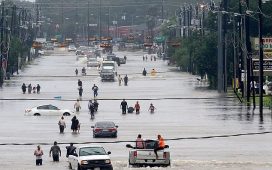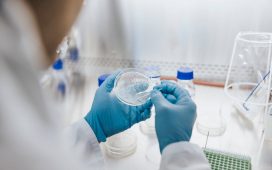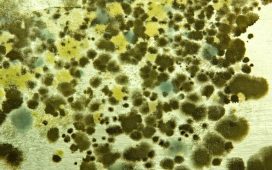Hand dryers are harboring a dirty little secret – the machines suck up bacteria from the air and spray them on freshly washed hands.
The invisible microbes were uncovered by TikToker @the_lab_life1, who took samples from dryers in a shopping mall, a movie theater and at her work on separate Petri dishes.
After incubating the samples, she discovered all three contained gooey, bubbling organisms – except for the air-dried dish.
The reason is not that the machines are riddled with bacteria, but the hand dryers push bacterial aerosols from the bathroom onto your hands.
While the laboratory scientist did not reveal what bacteria were captured, previous research shows that E. coli, hepatitis and fecal bacteria lurk in public restrooms.


The invisible microbes were uncovered by TikToker @the_lab_life1, who took samples from dryers in a shopping mall, a movie theater and at her work on separate Petri dishes
The shocking video is making people rethink using the hands-free dryers that promised to be more sanitary than machines with a push nozzle or pulling a leveler for a paper towel sheet.
The clip has earned over two million likes and over 12,000 comments from users horrified by the findings.
‘Question all the times I used the air dryer,’ one TikTok user commented.
While another shared: ‘And this is why I walk out of every bathroom with my hands dripping. Won’t catch me using a hand dryer.’
TikToker @the_lab_life1 explained: ‘All the bacterial aerosols from the bathroom are basically being pushed onto your hands.’
The sample taken from work appears to fire the most bacteria, and the scientist felt compelled to ‘pop’ one of the bubbles on the dish.
One of the samples was taken by waving the dish in the bathroom air to show comparison and was the only one not riddled with bacteria.
The scientist did not reveal what kind of bacteria she found, but previous research has found influenza, streptococcus, Methicillin-resistant Staphylococcus aureus (MRSA), salmonella, shigella and norovirus live in public restrooms.


The reason is not that the machines are riddled with bacteria, but the hand dryers push bacterial aerosols from the bathroom onto your hands
A study in 2015 investigated the microbes found in public bathrooms and found genetic traces of more than 77,000 distinct types of bacteria and viruses in these spaces.
And when you use a powerful hand dryer, those bacteria are lifted from surfaces and sprayed onto your hands.
It was previously believed that old models were so powerful that they captured germs, but a study conducted by the University of Connecticut and Quinnipiac University in 2018 found even those less powerful are bathing hands in fifth.
The team placed Petri dishes containing ‘bacteria food’ in bathrooms without hand dryers and found just six pathogen colonies grew within 18 hours compared to up to 254 after being blasted with such air for just 30 seconds.
These bacteria include Staphylococcus aureus, which is resistant to the antibiotic methicillin and can cause life-threatening sepsis, pneumonia or toxic shock syndrome.
Due to hand dryers’ abilities to transmit spores, they could potentially spread Clostridium difficile, according to scientists, which causes watery diarrhea that can lead to severe dehydration.


The shocking video is making people rethink using the hands-free dryers that promised to be more sanitary than machines with a push nozzle or pulling a leveler for a paper towel sheet
‘This suggests another means of C.difficile transmission and one that may not be interrupted by either hand washing or traditional surface decontamination methods,’ reads the study published in AMS Journals.
Much of the bacteria in the air comes from toilets being flushed, which aerosolizes a fine mist of microbes – including fecal clouds.
And these fecal clouds can disperse over an area as large as 65 square feet, Harvard Health Publishing reports.
With this in mind, experts urge people to use paper towels to dry their hands.
A study conducted by the University of Westminster in 2015 found Jet air dryers cause the greatest spread of microbes into the air – when they were designed to be the most sanitary.
People stick their hands between two dryers, allowing for a contactless service.

After incubating the samples, she discovered all three contained gooey, bubbling organisms – except for the air-dried dish
At a close distance from the jet air dryer, researchers found 59.5 colonies of yeast, compared with an average of just 2.2 colonies for paper towels.
There were 67 colonies of yeast 0.2m from the dryer, compared with only 6.5 for paper towels.
The greatest dispersal of microbes was found at 0.6 – 0.9m from the floor, the exact face height of small children who might be standing near the dryer.
Lead researchers Dr Keith Redway, of the University of Westminester, said: ‘These findings clearly indicate that single-use towels spread the fewest microbes of all hand-drying methods.
‘Cross contamination in public washrooms is a legitimate public health concern.
‘The extent to which jet air dryers disperse microbes into the washroom environment is likely to have implications for policy guidance to facilities managers operating in a wide range of environments from sports venues and airports through to schools and hospitals.’











